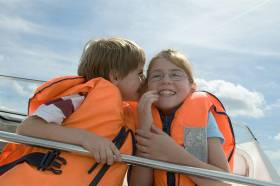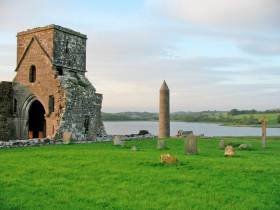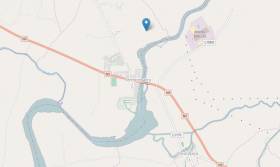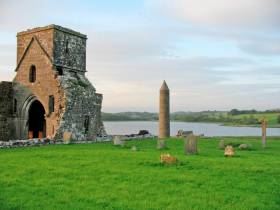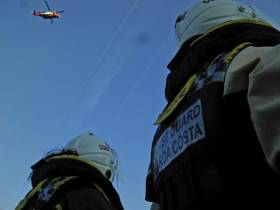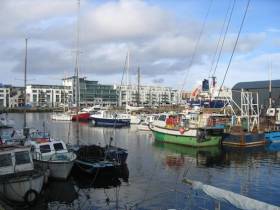Displaying items by tag: drowning
18-Year-Old Dies in Drowning Tragedy Off Donegal Island
RTÉ News reports that an 18-year-old man has died by drowning off the island of Arranmore (Árainn Mhór) in Co Donegal after getting into difficulty while swimming.
The incident occurred on Monday afternoon 3 January at the beach at Leabgarrow (An Leadbh Gharbh) shortly before 3pm, according to the Donegal News.
Despite the best efforts of emergency personnel, the casualty was pronounced dead at the scene and the body has been taken to Letterkenny University Hospital pending a post-mortem.
In the lead-up to the August Bank Holiday weekend, the Minister of State in the Department of Transport has issued an appeal to anybody engaging in coastal or water-based activity to pay close attention to their personal safety.
Today’s (Tuesday 27 July) water safety appeal by Minister Hildegarde Naughton alongside staff and volunteers of the Irish Coast Guard and the RNLI comes in the wake of more than seven water tragedies in seven days.
The latest of these occurred yesterday, Monday 26 July, when a 14-year-old boy recovered from Hollywood Lake in Co Monaghan on Sunday died in Dublin’s Temple Street Children’s Hospital, according to the Irish Mirror.
Also on Sunday 25 July, as The Irish Times reports, a man in his 60s was recovered from the water at Tramore in Co Waterford and was later pronounced dead in hospital.
Joined Minister Hildegarde Naughton, the Coast Guard and RNLI today at the Irish Lights Headquarters in Dún Laoghaire Harbour for the launch of an awareness campaign to remind people to take extra care in the water over the next few weeks. pic.twitter.com/eVcI3DFqjV
— Cormac Devlin TD (@CormacDevlin) July 27, 2021
“I would like to offer my sincere condolences to the loved ones of those we have lost at sea on their heartbreaking and untimely loss,” the minister said. “This loss of lives in as many days provides a stark reminder to us all as to how quickly serious accidents can happen.
“This Bank Holiday weekend we can all make personal decisions which will go a long way towards staying safe in the water, such as ensuring that swimmers are accompanied, not using inflatables and letting friends or family know your planned return time.”
The August Bank Holiday weekend is by tradition the peak holiday period, and with many people holidaying at home this summer it is likely that even greater numbers will avail of coastal and water-based activities.
The Marine Safety Communications group, which is coordinated by the Department of Transport, has identified three key safety areas:
- Inflatable toys should never be used on the beach or inland waterways.
- Swimmers should always ensure that they are accompanied or that their activity is being monitored by a colleague ashore. Open-water swimmers and.or longer-distance swimmers should wear a high visibility swim cap and use a tow float to ensure that they are visible at all times. Only swim in lifeguarded beaches or on beaches that are in regular use, be alert to local safety warnings and always ensure that somebody is aware of your planned return time.
- Users of Jet Skis and personal watercraft are asked to be mindful of swimmers by avoiding swimming areas and by observing local bye laws.
The Irish Coast Guard says it has seen a major growth in demand for assistance this year and to date has coordinated responses to a total of 1,763 incidents, an increase of 400 for the same period last year and 150 more than any year over the last five years.
Minister Naughton reminded anybody engaged in outdoor activities to always check the weather forecast and tide times and local conditions.
In addition to familiarising ourselves with tides we should also be mindful of the risk posed by local currents and in particular rip currents. These most typically form at low spots or breaks in sandbars, and near structures such as jetties, piers and the speeds under certain tide and beach profiles can quickly increase to become dangerous to anyone entering the water.
The minister also appealed to coastal walkers to avoid any areas with which they are not familiar and stay away from coastal and cliff edges. It is important to dress appropriately for the conditions, to wear a high-factor sunscreen, carry a fully charged, water-protected mobile phone and to bring enough food and water for the planned trip. (See below for a guide to safe coastal walking.)
Minister Naughton added: “I recently attended a meeting of the Search and Rescue Stakeholders Forum where I saw constructive engagement between the Maritime community, SAR coordinators and SAR providers I want to thank all those at the frontline of Search and Rescue in particular the three Coast Guard Coordination centres at Malin, Valentia and MRCC Dublin, coastguard and RNLI Volunteers, coastguard Helicopter crews and Community Inshore Rescue crews, as well as support provided by Navy and Air Corps resources.”
She concluded by encouraging everybody to attend to their personal safety, stating: “Remember, water will win if we do not observe basic water safety measures.”
Safety Guidelines for Coastal Walking
- Stay in Contact — Tell someone where you are going and what time you expect to be back, it is always best to be accompanied.
- Tides — Pay attention to local tidal times and local conditions. Be alert to the danger of getting stranded or cut off. www.Safetyonthewater.gov.ie
- Weather — Check the weather forecast.
- Route — Familiarise yourself with your planned route and any associated hazards. Seek local knowledge if you are unsure of the area.
- Phone — Ensure your phone is fully charged before setting out and carry it in a water proof container.
- Sunset — To avoid walking in darkness, be aware of the time the sun sets. If you know both this and the expected duration of the walk, you’ll have an optimum start time to set off.
- Sun Protection — Wear a hat. Wear a high factor sun protection.
- Safety Signage — Pay attention to any safety signage identifying hazards.
- Clothing — Dress appropriately and wear suitable walking footwear. Be visible: aim to wear at least one item of bright colour such as red or orange so that you remain visible to the people in your party or rescue services if needs be.
- Food and Water — Bring enough food and water for your journey and some extra rations in case your excursion goes on for longer than expected.
- Children — Ensure children are always supervised, keeping small children close to parents or adults during any coastal walking activity.
- Coastal and Cliff Terrain — Stay away from exposed coastal and cliff edges.
- Sea Conditions — Do not underestimate the unpredictable nature of sea conditions where swell or wave activity can change dramatically and sweep a person without warning from a rock edge into the sea. Stay Back, Stay High, Stay Dry.
- Dogs — Keep dogs under control and do not enter the water to rescue animals. Ring 999/112 for assistance.
For more information on how to stay safe this summer, visit www.gov.ie/summerready
The number of drowning tragedies around Ireland this week has risen to six after the deaths of a man in his 60s and a teenage boy.
As BreakingNews.ie reports, the man was recovered unconscious from the water at Dollymount Strand in north Dublin yesterday afternoon (Friday 23 July).
Despite the vest efforts of lifeguards and off-duty medical personnel, he was pronounced dead at the scene.
Elsewhere, a 15-year-old boy rescued after getting into difficulty in Lough Sheelin on Tuesday (20 July) died in hospital on Thursday evening (22 July).
Their deaths bring the toll of drownings this week on the island of Ireland to five, following incidents in counties Cavan, Leitrim and Fermanagh and Down, as previously reported on Afloat.ie.
Four people have drowned in separate tragedies around the island of Ireland yesterday, Wednesday 21 July, as the Irish Independent reports.
In Co Cavan, a woman in her late 20s died after entering the water at Loch Gowna to rescue her nine-year-old son who had got into difficulties.
Separately in Co Leitrim, the body of a man in his 70s was recovered from Spencer Harbour in Drumkeeran after he failed to return from snorkelling.
And a 55-year-old man died after entering the water in the Lough Melvin area in Co Fermanagh, just days after another Northern Ireland tragedy that took the life of a 13-year-old boy in a lake near Scarva in Co Down.
#WaterSafety - Irish Water Safety, the Irish Coast Guard and RNLI have issued a joint appeal reminding the public to stay alert to the risk of drowning at all times and especially in the current hot weather.
On average, five people drown in Ireland every fortnight — and the risks increase during July and August, the most popular months for swimming and other water-based activities.
The joint appeal includes the following water safety advice to avoid summer tragedy:
- Swim within your depth and stay within your depth. Never swim alone.
- Wear a lifejacket or personal floatation device when on or near the water and make sure that it has a correctly fitting crotch strap. This applies when boating but equally to both experienced and once-off casual anglers fishing from shore.
- Supervise children closely and never use inflatable toys in open water. The recent multiple rescue off Fethard is testament to the dangers of using inflatables where a sudden current can put lives under threat.
- Swim at lifeguarded waterways listed by Irish Water Safety, or in areas that are known locally as safe and where there are ring buoys present to conduct a safe rescue.
If you see someone in difficulty, these simple steps may save a life:
- Shout to the casualty and encourage them to shore. This may orientate them just enough.
- Reach out with a long object such a branch or a piece of clothing but do not enter the water yourself.
- Throw a ring buoy or any floating object, call 112 and ask for the coastguard.
Waterways Ireland is also running a campaign with Irish Water Safety to encourage the wearing of lifejackets and personal flotation devices on the Shannon Navigation during the 2018 summer boating season.
The awareness campaign will aim to emphasise the importance of wearing lifejackets at key focal points along the Shannon.
You may notice some new signage which will be erected at key locations – locks and marinas — encouraging water safety. Information leaflets will also be distributed to water users at these key locations on the water.
Waterways Ireland encourages the safe use of its waterways by all. The wearing of lifejackets and personal flotation devices is not only an effective way of enhancing water safety, it is also a legal requirement on all pleasure craft in Ireland.
Murder Charge Over Woman’s Death In Lough Erne This Past April
#LoughErne - BelfastLive reports that a man has been charged with the murder of a woman whose body was found in Lough Erne earlier this year.
Lu Na McKinney was recovered from the water by emergency services in the early hours of Thursday 13 April.
As previously reported on Afloat.ie, the 35-year-old mother of two from Donegal was believed to have slipped from the deck of a boat while checking it was tied to the jetty.
Yesterday a PSNI spokesperson confirmed that a 41-year-old man had been charged with her murder and was due before Omagh Magistrates’ Court this morning (Tuesday 5 December).
The man is also charged with possession of a Class C controlled drug, a classification which includes a number of tranquilisers.
Tributes To Teen Who Drowned In Shannon Marina Incident
#Shannon - Tributes have been paid to a Longford teen who drowned at a marina on the River Shannon yesterday afternoon (Tuesday 18 July), as RTÉ News reports.
Damola Adetosoye, 17, was among a group of 20 teenagers who were swimming at a marina near Termonbarry when he got into difficulty.
The tragedy comes less than a month after Irish Water Safety (IWS) issued its annual summer advisory to the public for National Water Safety Awareness Week (19-25 June).
IWS noted that the majority of drownings — some 62% — occur inland in Ireland’s lakes and rivers, while 80% happen within the victim’s home county.
“Such statistics reinforce the importance of learning how to stay safe in, on and around water,” said the water safety body.
Donegal Woman Drowns In Lough Erne Tragedy
#LoughErne - A Donegal woman drowned after a boating accident on Lough Erne late on Wednesday night, as RTÉ News reports.
The woman is believed to have fallen overboard from a hired vessel she and her husband and children has been using for the Easter holidays.
It’s thought the 35-year-old slipped from the deck while checking the boat was tied to the jetty at Devenish Island, near Enniskillen, in the early hours of Thursday 13 April.
The Belfast Telegraph adds that the woman’s husband dived into the lough to attempt a rescue after hearing a splash but could not find her in the dark.
Her body was recovered by emergency services 40 minutes later just metres from the stern of the boat. CPR was attempted at dockside but she was later died in hospital.
The Belfast Telegraph has more on the story HERE.
Woman Swept By Wave Drowns Off Clare Coast
#Drowning - A post-mortem was expected today (Monday 11 July) on the body of a woman who drowned off the Co Clare coast yesterday morning.
RTÉ News reports that the 53-year-old woman from Eastern Europe but living in Co Tipperary was with a fishing group at Ballyreen when a wave swept her into the sea.
She was recovered some time later around 1km from the spot where she was washed in.
Despite best efforts by volunteers and Irish Coast Guard crew to save her, she was pronounced dead after she was flown to University Hospital Galway.
Two Drown In Separate Galway Incidents
#Galway - BreakingNews.ie reports that two people are dead after separate drowning incidents in Galway city yesterday afternoon (Saturday 11 June).
North of the city, the body of a 19-year-old man was recovered from the River Corrib near NUI Galway around 2pm.
At the same time, the body of a woman thought to be in her 40s or 50s was discovered in Galway Docks. BreakingNews.ie has more HERE.



























